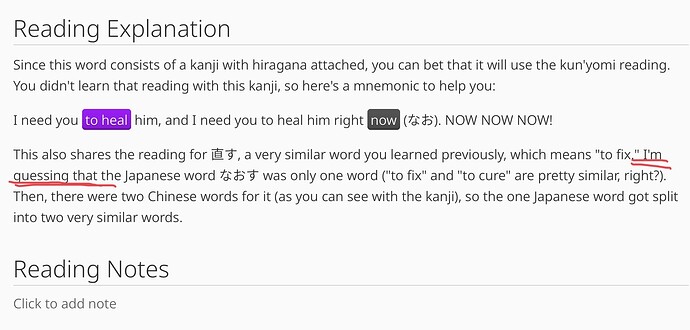Rather than saying ‘I’m guessing that’ and then offering a, though not necessarily incorrect, fairly base level explanation of something, I feel like there is opportunity here to teach this phenomenon in a bit more detail. There are a great number of verbs which can be written using different kanji to give them nuance, why not dive into that a little bit — maybe give a bit more of a definite explanation? I know the goal of this platform isn’t to do much more than help drill kanji and vocab, but I think giving people this sort of information would probably help with that as well.
Yeah, sometimes you need to sit on them before they’ll do any actual etymological research. The page on 交番 used to say something along the lines of “why do 交 and 番 combined mean “police box”? Who knows? It shall be a mystery for the ages”
Might be worth doing the research yourself and e-mailing it to hello@wanikani.com ![]()
I doubt it would have much utility outside a very small handful of curious learners, but I would love if they had a dedicated tab on each word that, even if not filled when no noteworthy info, had etyomology notes. Being able to tie history to each term would also serve as a great mnemonic- though I can understand 100% why WK devs wouldn’t want to type out thousands of mini history lessons on top of what’s already offered.
For as much as I’d appreciate if they filled in gaps a little more (like in the pictured example), on the other hand though I can admire the quaint and personable feel they have going with their more casual explanations too. Feels a little less textbook-y if that makes sense. Maybe just a me thing but both sides of the coin here have their value.
Great suggestion and I’m glad there’s an audience for rich language culture being explored fully. Love it.
